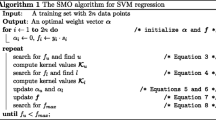Abstract
Nowadays, it is usual to work with large amounts of data since our capacity of collecting and storing information has increased significantly. The extraction of knowledge from these scenarios is commonly known as “Big Data,” and it is performed on large clusters with MapReduce platforms. Imbalanced classification poses a problem both in traditional and Big Data learning scenarios. Data sampling is one of the ways that allows to improve the performance on imbalanced problems. A commodity hardware-based method for Big Data problems can offload these computations from the expensive and highly demanded hardware that MapReduce platforms require. The characteristics of some sampling methods make them suitable to be adapted to commodity hardware, taking advantage of the parallel computation capabilities of graphics processing units. SMOTE is one of the most popular oversampling methods which is based on the nearest neighbor rule. The proposed SMOTE-GPU efficiently handles large datasets (several millions of instances) on a wide variety of commodity hardware, including a laptop computer.

Similar content being viewed by others
Explore related subjects
Discover the latest articles and news from researchers in related subjects, suggested using machine learning.References
Alcalá-Fdez, J., Sánchez, L., García, S., del Jesus, M., Ventura, S., Garrell, J., Otero, J., Romero, C., Bacardit, J., Rivas, V., Fernández, J., Herrera, F.: KEEL: a software tool to assess evolutionary algorithms for data mining problems. Soft Comput. 13(3), 307–318 (2009)
Bache, K., Lichman, M.: UCI machine learning repository (2013). http://archive.ics.uci.edu/ml
Baldi, P., Sadowski, P., Whiteson, D.: Searching for exotic particles in high-energy physics with deep learning. Nat. Commun. 5 (2014)
Bradley, A.P.: The use of the area under the ROC curve in the evaluation of machine learning algorithms. Pattern Recognit. 30(7), 1145–1159 (1997)
Chawla, N.V., Bowyer, K.W., Hall, L.O., Kegelmeyer, W.P.: Smote: synthetic minority over-sampling technique. J. Artif. Int. Res. 16(1), 321–357 (2002)
CUDA. http://www.nvidia.com/object/cuda_home_new.html. Accessed March 2017
Dean, J., Ghemawat, S.: Mapreduce: simplified data processing on large clusters. Commun. ACM 51(1), 107–113 (2008)
ECBDL14 dataset: Protein structure prediction and contact map for the ECBDL2014 big data competition (2014). http://cruncher.ncl.ac.uk/bdcomp/
Fernández, A., del Río, S., Chawla, N.V., Herrera, F.: An insight into imbalanced big data classification: outcomes and challenges. Complex Intell. Syst. (in press). doi:10.1007/s40747-017-0037-9
Foundation, A.S.: Apache Mahout (2017). http://mahout.apache.org/. Accessed March 2017
Gutiérrez, P.D., Lastra, M., Bacardit, J., Benítez, J.M., Herrera, F.: GPU–SME–kNN: scalable and memory efficient \(k\)NN and lazy learning using GPUs. Inf. Sci. 373, 165–182 (2016)
Gutiérrez, P.D., Lastra, M., Herrera, F., Benitez, J.M.: A high performance fingerprint matching system for large databases based on GPU. IEEE Trans. Inf. Forensics Secur. 9(1), 62–71 (2014)
He, H., Garcia, E.A.: Learning from imbalanced data. IEEE Trans. Knowl. Data Eng. 21(9), 1263–1284 (2009)
Hoare, C.A.R.: Algorithm 64: quicksort. Commun. ACM 4(7), 321 (1961)
Krawczyk, B.: Learning from imbalanced data: open challenges and future directions. Progr. Artif. Intell. 5(4), 221–232 (2016)
López, V., Fernández, A., García, S., Palade, V., Herrera, F.: An insight into classification with imbalanced data: Empirical results and current trends on using data intrinsic characteristics. Inf. Sci. 250, 113–141 (2013)
Madden, S.: From databases to big data. IEEE Internet Comput. 16(3), 4–6 (2012)
Meng, X., Bradley, J., Yavuz, B., Sparks, E., Venkataraman, S., Liu, D., Freeman, J., Tsai, D., Amde, M., Owen, S., et al.: MLLIB: machine learning in apache spark. J. Mach. Learn. Res. 17(34), 1–7 (2016)
Owen, S., Anil, R., Dunning, T., Friedman, E.: Mahout in Action, Manning Publications Co., Greenwich, CT, USA, ISBN:1935182684, 9781935182689 (2011)
Prati, R.C., Batista, G.E.A.P.A., Silva, D.F.: Class imbalance revisited: a new experimental setup to assess the performance of treatment methods. Knowl. Inf. Syst. 45(1), 247–270 (2015)
Rajaraman, A., Ullman, J.: Mining of Massive Datasets. Cambridge University Press, Cambridge (2011)
Salomon-Ferrer, R., Götz, A., Poole, D., Le Grand, S., Walker, R.: Routine microsecond molecular dynamics simulations with amber on GPUS. 2. Explicit solvent particle mesh ewald. J. Chem. Theory Comput. 9(9), 3878–3888 (2013)
Spark, A.: Machine Learning Library (MLlib) for Spark (2017). http://spark.apache.org/docs/latest/mllib-guide.html. Accessed March 2017
Triguero, I., del Río, S., López, V., Bacardit, J., Benítez, J.M., Herrera, F.: ROSEFW-RF: the winner algorithm for the ECBDL’14 big data competition—an extremely imbalanced big data bioinformatics problem. Knowl. Based Syst. 87, 69–79 (2015)
White, T.: Hadoop: The Definitive Guide, 4th edn. O’Reilly Media Inc, Sebastopol (2015)
Zaharia, M., Chowdhury, M., Das, T., Dave, A., Ma, J., McCauley, M., Franklin, M.J., Shenker, S., Stoica, I.: Resilient distributed datasets: a fault-tolerant abstraction for in-memory cluster computing. In: Proceedings of the 9th USENIX Conference on Networked Systems Design and Implementation, pp. 1–14. USENIX Association (2012)
Zikopoulos, P.C., Eaton, C., deRoos, D., Deutsch, T., Lapis, G.: Understanding Big Data: Analytics for Enterprise Class Hadoop and Streaming Data, 1st edn. McGraw-Hill, New York (2011)
Acknowledgements
This work was supported by the Spanish National Research Projects TIN2013-47210-P, TIN2014-57251-P and TIN2016-81113-R and by the Andalusian Regional Government Excellence Research Project P12-TIC-2958. P.D. Gutiérrez holds an FPI scholarship from the Spanish Ministry of Economy and Competitiveness (BES-2012-060450).
Author information
Authors and Affiliations
Corresponding author
Rights and permissions
About this article
Cite this article
Gutiérrez, P.D., Lastra, M., Benítez, J.M. et al. SMOTE-GPU: Big Data preprocessing on commodity hardware for imbalanced classification. Prog Artif Intell 6, 347–354 (2017). https://doi.org/10.1007/s13748-017-0128-2
Received:
Accepted:
Published:
Issue Date:
DOI: https://doi.org/10.1007/s13748-017-0128-2




